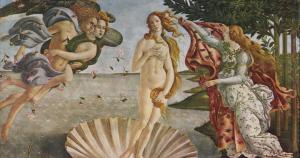 God is love and has built a cosmos that is based on love. As a result, God allows us to consent to serve Him. One aspect of goodness in the cosmos, obvious to all of us, is beauty. Everywhere we look there is beauty. This is a sign not just His existence, but of His nature.
God is love and has built a cosmos that is based on love. As a result, God allows us to consent to serve Him. One aspect of goodness in the cosmos, obvious to all of us, is beauty. Everywhere we look there is beauty. This is a sign not just His existence, but of His nature.
There is also ugliness and evil, some of which we can explain by our misuse (my misuse!) of our ability to consent. Plato notwithstanding, we do not always choose the good. The stone we throw at the cosmos causes ripples of pain, not the sort that brings growth, but destructive, gratuitous pain. There are a finite number of actions, but they are so vast no human can measure all the possible results. We cannot be sure that “we live in the best of all possible worlds” just based on the external data. We must also see God and His nature. If we see God, through means apart from the goodness and beauty of the universe, then like Job we may be able to trust (reasonably) that the outcome will be as good as it can be.
This process begins in childhood and might move something like this:
- How beautiful my Mother is!
- How beautiful the family is!
- How beautiful the stars are!
- How splendid is the community!
- How glorious are these ideas!
- Conclusion: This is the work of a splendid, divine Craftsman*
- And yet some things are not beautiful, are not good, some are very ugly and evil, what of this?
- Is this a sign that I have gotten things wrong? Could be. . .let us see.
- Arguments from philosophy and religious experience persuade me that the beauty is what is basic, not the ugliness, the cosmos is heading toward justice, not injustice.
All will be well in eternity. One reason to think this is true is our surety that we are supersaturated in natural beauty. The ugliness is impossible to explain, because in a free will cosmos there would be no way to finally “explain” the plan. The cosmos is just too complicated, so there is a necessary ignorance of what a good Craftsman could and is doing. The calculation of the possibilities is too great and there is not just one best outcome. Imagine a perfect cosmos, interlocking in multiple dimensions, hit by even the simplest evil or ugly action.**The ripples across space and time would be great. God would heal, reconcile, but that healing and reconciliation would impossible for us to see in the short span of human history. God has eternity. We have millennia.
The good news in this is that there is also not just one “best” outcome. God also has choice.*** For example, one good outcome in the cosmos would be the beauty of the Isle of Skye where I spent the best afternoon of my life. Whatever, I might wish God could have placed something else beautiful where we find Skye without harm. God has choices between goods. An analogy is our ability to choose what to eat for dinner tonight. Our preferences rule: sushi, vegetarian, or tilapia? Will we have ice cream or chocolates for dessert? We can choose! Beautification, to pick on good, has many possibilities. Thank God.
Saying all of this did not mollify an atheist critic on social media:
I vastly prefer plainly stated arguments over narrative in case you wondered.
Amen. Let us be as concise and clear as we can be. There is much to be learned from beautiful poetry, but we need not be long or flowery!
This “goods are different, they can’t be quantified” approach just does not hold up. EVEN ice cream vs chocolate has different effects on the world eg, ice cream more calories than chocolate. To calories, the point is that the effects in the world are different, and after a particular effect, the causal chain keeps going. Dominos keep falling, whether or not we want to stop thinking about whether a particular domino is important, they do continue, and each one has a good value. IOW I think you 1) make a category error but 2) fail to take into account the passage of time/follow on effects.
We do not have falling dominoes. That is simple. We have actions that reverberate in every dimension over all of time. My central idea is that even the most neutral action (!) has (almost) incalculable impact. My choosing to respond to this person changes everything. You getting up this morning made the cosmos different. We cannot hope to know what is best given all the free will choices made and our own mental limitation. We see so little form our tiny Earth bound perspective.
Take the example given: calories. More calories can be good for a person as many an elderly person has discovered when going to the doctor! What is best? This is complex! What is best for my physical health (no cheesecake) may reduce my pleasure in eating, a different good. We cannot assign a “number” to any good and say which is best without seeing all the implications. This is my very point. We cannot know so the problem of the world by the atheist is a whine based on ignorance.
There are horrid things, but much beauty. The most horrid things are human things, done by us. Why think a good God, over eternity, could not bend the arc of history toward justice? The response to this:
Can god not do anything he puts his mind to? This does not seem like a serious objection to me. You agree some goods are better than others. That’s enough, one does not have to propose a scale. He knows.
There are three problems here. First, God can do anything God decides to do. God is rational, so God can do what a rational being would do. He cannot, for example, do irrational things, since that would contradict His nature! Not being able to do what you do not wish to do is not a limitation that matters to God’s power.
Second, some goods are better than others, but sometimes, out of sheer preference, we prefer the lesser good. Reading Plato is always better than reading lesser books, but the lesser books are not evil. Sometimes I like reading a rip-roaring fantasy novel, some Brandon Sanderson tome. That is not making the world bad, just exercising my free will. After all, God is always a better conversation partner than anyone else, but nobody thinks we should never talk to anyone but God!
Finally, God knows what God will choose to do, but that does not mean God could not have done differently. If God wished to make six feet tall, that is good. If God wished to make me five feet talk, that also would be good. There is not moral or beatific difference. Of course, healing the ugliness is hard, correcting the injustice or evil. There would be, however, many ways to do so, many balms to apply. There is no reason to think one would be preferable to another.
I cannot compose a beautiful song, Bach could. Bach is better than I am, but there are still homey cases where my homely music is worth playing and singing. We might choose this little pleasure in our little situation over something greater. That is the beauty of free will in a cosmos where almost nothing is forbidden. That we as humans fixated on the few forbidden things is our problem.
My critic remains unpersuaded:
There’s a slight wrinkle when you want to use beauty as a measure. The correct measure is simply goods. “Does this beauty create goods? How do the goods compare”.
Let me state it plainly: You can have a million johns and it still won’t be Bach. Because this is a qualitative question. But “how much beauty” isn’t the Q. The Q is what *goods*.
So. To close the loop here, this can be asked slightly differently. “Is a world with X in it more good than a world with Y in it” where X is a painting by someone, and Y is a painting by someone else, for example. And then you can iterate as below if you want:
You are going to hate this but here is the answer. More simple iterating, I can find out an answer this way:
Is Bach > John?
Is Bach > John John?
Is Bach > John John John?
Is Bach > John John John John John?
Of course this does not work. Bach is always greater than any number of my home spun compositions. You cannot, as my dialog partner conceded, accumulate a pile of lesser goods to get greatness. More good, something more beautiful, can be better, but we can also choose differently. I do not have to ever eat dessert, but sometimes I can! There are any number of perfectly good possible worlds where things are very different.
How is this possible?
You cannot measure “goodness” on a scientific scale. If there is no gratuitous pain, free will is preserved, and all is healed and whole, then any number of things might have happened. Titian might not have painted, but done some other perfectly fine thing. We might have not seen a “Big Dipper,” but some other arrangement of stars in the sky. Given God’s power, and the many choices God has given us, there is not one outcome, like the old choose-your-own-adventures-books. There are many. Of course none of them should include our using torture (ever!), but if we do, then the methods of healing the pain are varied and take place over infinity.
The good news is that the good and the beautiful, the greater and the less, are all licit and we can choose any based on what we will.****
*See Plato in Phaedrus, Symposium, and Timaeus for the seminal expression of these ideas! Try AE Taylor “Does God Exist” for a modern take.
**We are not talking here merely of irregularity, the crush notes in God’s composition, or mistakes, or growing pains. These are not evil. We mean acts of evil that Aristotle would call “base by nature.” For example, throwing battery acid into the ocean for fun is never a good act.
***I speak as if God is “in time” because that is the way we speak! One should write “timelessly,” but an article that is already overly long would get longer.
****Of course, some goods may be overdone and become bad. Some goods may be inappropriate at a time, but that still leaves many choices at any moment. What will Hope and I choose tonight? What larks!












